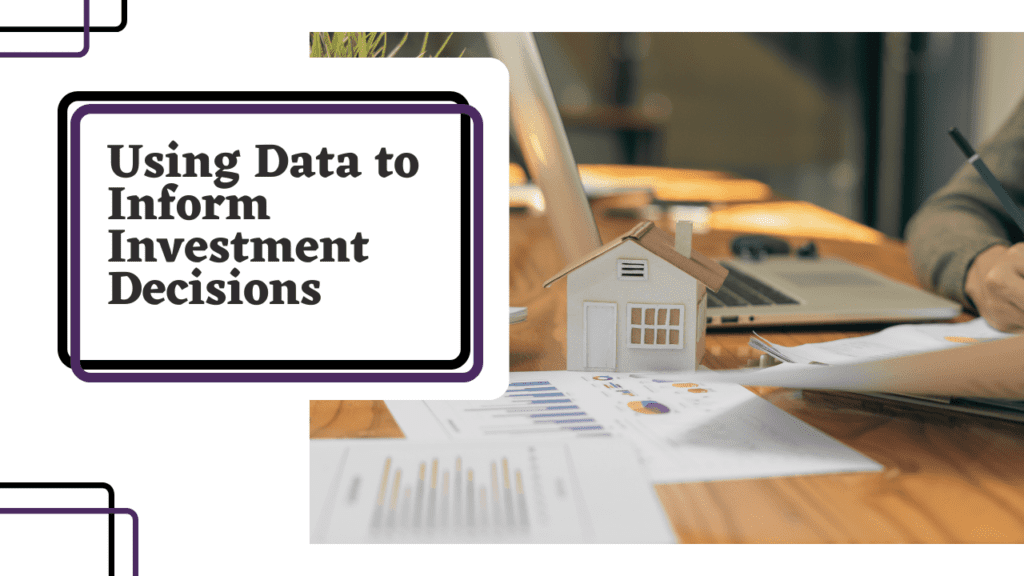
How do you make your real estate investment decisions?
Are you instinctual or analytical? Do you go with what feels right or do you prefer to study reports and statements and trends?
At Realty Solutions, we believe strongly in our gut instincts. But we also like to back up what we think and feel with a solid set of data. It ensures we’re making decisions that are results-based and true to our investment goals.
Whether you are thinking about investing for the first time or you’re thinking about growing an existing real estate portfolio, you’ll have to be strategic about how you make your investment decisions. We recommend that you analyze market trends and that you put together a set of property performance metrics to inform the moves you make.
This will help you buy, sell, improve, and exchange.
Your South Jersey rental properties are extremely valuable assets. You’re essentially running a business, even if you’re only renting out a single property.
Business owners make decisions based on performance and data. They access and understand financial metrics so they can help their business be more successful.
How do you know what you’re really earning? And, is it enough?
What are you losing on your property every month, quarter, or year? Is it tolerable or do you need to make some changes?
Smart investors will establish some sound investment goals before they even think about making a purchase. We expect you’ve done the same. You should know why you’re investing and what you’re hoping to accomplish.
The investors we work with are diverse. Some of them are hoping to simply earn a little bit of income every month. Others are saving for retirement. Many of our investors are trying to build a portfolio that can establish financial security and wealth.
In our professional South Jersey property management experience, we have seen a lot of investors fail because they don’t have a strong set of goals and they don’t understand what success looks like or how to pursue it. On the brighter side, we have also seen a number of smart investors succeed. Those rental property owners are successful because they’re willing to treat their investment property like a business.
They’re willing to invest in data and solid financial metrics.
HOW TO ANALYZE THE MARKET WITH THE RIGHT DATA
 Market research is something that every successful real estate investor does before buying in a specific market. If you have not done your homework on the performance of the South Jersey rental market, you’re probably not ready to buy here just yet. Why close the deal on an investment disaster that will only cost you money and time? Due diligence is important, and while the necessary market research can take time, understanding the local rental market and its trends can help investors make more informed investment decisions.
Market research is something that every successful real estate investor does before buying in a specific market. If you have not done your homework on the performance of the South Jersey rental market, you’re probably not ready to buy here just yet. Why close the deal on an investment disaster that will only cost you money and time? Due diligence is important, and while the necessary market research can take time, understanding the local rental market and its trends can help investors make more informed investment decisions.
Analyzing the available data is one of the most reliable ways to gather information on the rental market you’re pursuing. You can drill down into specific neighborhoods so you know exactly what you need to know before you buy. You can compare locations. You can see the pros and cons to different communities and neighborhoods. With publicly available data on various platforms, it is now possible to evaluate market conditions accurately. It will also improve your chances of success if you can access data that only local experts have. Consult with a South Jersey property manager, for example.
Using Data to Analyze the Target Rental Market
|
Understand Your Ideal Tenant The first step to using data effectively to understand your market is creating a profile of the perfect tenant. There is a large pool of tenants to choose from in the market, and the demand for rental housing has grown with the higher population and the higher mortgage prices which are keeping people out of the sales market. With a clear understanding of your perfect tenant profile, you can ensure that your investment decision is aligned with the market’s strengths. Study the local tenant demographics so you’ll know whether you’re likely to be renting to remote workers, families with children, retirees, or some combination of those groups. Understand their income, age, and what they consider essential when they’re looking for a rental home. Once you have this information, you can analyze data based on factors that will appeal to these prospects. Analyze Rental Rates and Occupancy Analyzing the rental rates and occupancy for a specific location can reveal vital information for real estate investors. By comparing rental rates, you can know the market rate for each neighborhood and what to anticipate for a property. If that’s the area you’re hoping to buy in, you need to know whether rental values are higher than average or a bit lower. If rates are relatively high, it indicates a high demand area, which is favorable for investors. It’s crucial to keep a close eye on occupancy levels to understand the area’s overall health. Gather Transactional and Demographic Data Transactional and demographic data are important, and this information will help you form an insight into a market’s economic performance. It also shows you what kind of demand there is for rental properties. You’ll need to know if tenants are looking for single-family homes or multi-family units. Do they want yards? Parking? Amenities? By examining the current demand, investors can get a more holistic view of the rental market. For example, transaction data can help you discover which neighborhoods are under-performing, even in a thriving rental market. You’ll see where homes are overpriced and whether there’s enough inventory to meet the demand. Check Out The Competition Accessing the right data will also help you understand your competition. When you see who else is buying in the market, you know if you’re competing against individual property owners, accidental landlords, or institutional investors. Looking at similar rentals can help you avoid unreasonable rental prices. You’ll know who is having success and who is struggling. This can help you position yourself better within the market. You need to know if your property is unique or if there are dozens just like it. Use data to take an in-depth look at what your competitors have to offer. Use it to analyze pricing trends and the amenities provided, and see how you can compete for tenants. |
|
Stay On Top of Trends and Developments!
You don’t get to look at things once and then never follow the story again. For successful real estate investors, keeping an eye on market trends and developments is an ongoing task, and necessary to recognize when conditions shift. While data analysis provides insightful information, it is essential to couple it with market forecasts and insights into consumer behavior. It assists in recognizing how the rental market may shift in the future.
Using data to analyze the rental market can be the deciding factor between investing in an area that’s likely to see high growth and avoiding an area that’s in decline. With more accurate projections into demand, risks, and future prospects, investors can make more informed decisions.
HOW TO ANALYZE YOUR RENTAL PROPERTY’S PERFORMANCE

Data and financial metrics are instrumental in helping you locate a good investment. But, what can these tools do for you when you already have a stable investment portfolio or a property that you’re trying to decide whether to hold or sell?
You’ll find that when you can access the right data and analyze it effectively, you make smarter decisions and earn more money.
Let’s take a look at some of the most important metrics in any investor’s toolbox.
Are You Analyzing Cash Flow for Your South Jersey Investment Property?
Cash flow is perhaps the first and most essential financial metric you will consider when you’re evaluating the performance of your investment property. Is it renting? Are your tenants paying the rent? This is important in bringing in any cash flow at all. Only an occupied property is earning you money every month.
Cash flow helps you understand what your rental property can earn for you. If you’re thinking about a potential acquisition, you’ll want to estimate how it’s able to cash flow. If you’re already renting out a property, its success likely depends on how much rent you’re earning every month and how that stacks up against your expenses.
Defining Cash FlowThis financial metric has a simple definition: cash flow is the profit you earn after your expenses have been paid in a given month. Add up all the rent you collect and subtract the expenses, which might be a mortgage payment, taxes, insurance premiums, etc. Whatever is left from that equation is your cash flow. |
How much cash flow is enough?
 In a perfect world, where your real estate investments are making you rich, you’re earning positive cash flow. That means the rental income you collect more than covers your expenses. Negative cash flow can happen, though, and it doesn’t mean your investment property isn’t profitable.
In a perfect world, where your real estate investments are making you rich, you’re earning positive cash flow. That means the rental income you collect more than covers your expenses. Negative cash flow can happen, though, and it doesn’t mean your investment property isn’t profitable.
There are many ways to earn money with South Jersey real estate, and this leads us to our next financial metric.
Total Return and Your South Jersey Investment Property
Calculating and understanding total return is a little different because it includes your cash flow, but it also considers appreciation, depreciation, and amortization. This metric is a bit more involved and requires a little more data. Make sure you can access that data.
|
Appreciation The growth in value that you can count on for your rental property. It will be worth more when you sell it than when you bought it. |
|
Depreciation The generous tax benefit you get from the IRS. Each year you own a rental property, you can depreciate it on your taxes for up to 27.5 years. |
|
Amortization The pay down of your debt. Residents are essentially helping you pay down your mortgage, and that adds to your equity. |
Total return allows for negative cash flow and allows you to see the full picture of your investment’s value and profitability. It’s an important metric, especially for investors who understand there’s more to their earnings than simple cash flow.
Return on Investment (ROI)
Return on Investment, or ROI, is a term that you probably hear a lot in real estate circles.
What does it mean?
|
Defining ROI ROI is a financial metric that shows you what you’re earning on the money you’ve invested. If you put $200,000 into a property and you know that you’ve earned $20,000 on it, your ROI is 10 percent. Understanding your likely ROI is especially useful when you’re deciding which property to invest in. |
METRICS ON VACANCY AND RETENTION
How do these metrics impact profitability?

Thinking about your existing portfolio, one of the most important financial metrics and indicators of success is your vacancy rate. Vacancy is always too expensive. It impacts what you’re earning now and what you’re capable of earning in the long term.
Take a look at vacancy rates and the speed with which you place tenants. Make sure you consider your turnover rate as well. How likely are your tenants to renew their lease agreements?
Tenant retention is always your goal, especially when you have an excellent tenant. You want to keep that resident in place. However, you also have to consider your rental value. A tenant who has been in place for 8 or 10 years is likely paying a rent that’s slightly below market value.
Measure that risk against the likelihood of high turnover costs if that tenant moves out.
You don’t want to lose the tenant, but you do want to bring your rents to market rates. Can you do that without chasing your existing tenant out? And, if they do move out, how much will you be spending on repairs and improvements.
These are the metrics to hold near and dear when you’re deciding on lease renewals.
WHAT ELSE IS THERE TO KNOW?
Additional Metrics for Review When Investing in South Jersey
 As we mentioned at the beginning of this blog, you have to know where you are and what’s happening in the market. Maybe you’re investing from out of state. Maybe you don’t have time to keep up every time the market shifts. That’s fine, but when you’re thinking about your financial metrics and how they should look, you need to know that real estate is extremely local and very nuanced.
As we mentioned at the beginning of this blog, you have to know where you are and what’s happening in the market. Maybe you’re investing from out of state. Maybe you don’t have time to keep up every time the market shifts. That’s fine, but when you’re thinking about your financial metrics and how they should look, you need to know that real estate is extremely local and very nuanced.
What you read about national trends does not necessarily apply to South Jersey.
As South Jersey property managers, we’re always taking the pulse of our market. That’s why it’s so important to surround yourself with experts. We keep our investors and property owners informed. We share what we find and we’re here to discuss what those findings mean for your unique rental property or your portfolio of rental properties.
The way you calculate your earnings will depend on a number of things, including:
- The size of your portfolio
- The age of the homes in that portfolio
- The investment goals that you’re personally working towards
There are always commonalities, however, and what we tend to see when we’re talking about measuring financial metrics is a tendency to focus on one or more of the following:
|
Net Operating Income Net Operating Income follows this formula: You’ll subtract your expenses from your revenue. It’s simple math and a good starting point. It doesn’t take into consideration your mortgage debt or any improvements you’ll have to make to the property before renting it out. |
Gross Rent Multiplier The Gross Rent Multiplier requires you to take the property price and divide it by the gross annual rent you anticipate earning. This can be useful when you’re measuring one potential investment against another. You’ll know which is most likely to earn you more. |
|
Capitalization Rate The Capitalization Rate or Cap Rate allows you to divide your Net Operating Income (NOI) by the total price you’re paying for the home. This can be used on all different property types, and smart investors have a specific number in mind before they buy. The only thing to watch for here is that usually you have to rely on the seller’s numbers. Do what you can to gather your own data on what you’ll earn on a potential rental property. |
Cash on Cash Finally, the Cash on Cash metric asks you to divide your cash flow by the cash you paid in the real estate deal. It’s an important part of identifying how much return you’re earning on your investment. Most investors want to earn more cash with real estate than they do with their other investments. |
These are the best and most basic financial metrics we can share with you right now, without understanding your unique position, the properties you own, and the investment goals you’re trying hard to reach. If you’re looking for something more customized, we’d be happy to provide it.
Let’s talk about your investment portfolio. Please contact us at Realty Solutions, and we’ll see what we can do to help you avoid those expensive turnovers and have a profitable and pleasant rental experience. We lease, manage, and maintain homes in Audubon, Collingswood, Cherry Hill, Haddon Heights, Blackwood, and the surrounding communities.
